Report: Mini Project Workshops and Development of Employability Skills
VerifiedAdded on 2023/01/11
|10
|2807
|47
Report
AI Summary
This report analyzes the contribution of mini project workshops to the development of student employability. It explores how these workshops enhance various skills, including time and task management, academic writing, group formation, presentation skills, and communication skills. The report also discusses the importance of academic integrity, reflection, and employability skills such as CV writing, cover letters, interview preparation, and job search strategies. Mini projects are shown to be crucial in applying theoretical knowledge practically, boosting performance, and acquiring new skills that contribute to a high-quality placement. The report emphasizes the significance of each skill and its role in a student's overall self-development, highlighting the importance of effective time management, clear academic writing, creative presentations, and strong communication skills. The report also touches upon the stages of group formation and the importance of academic integrity for students.
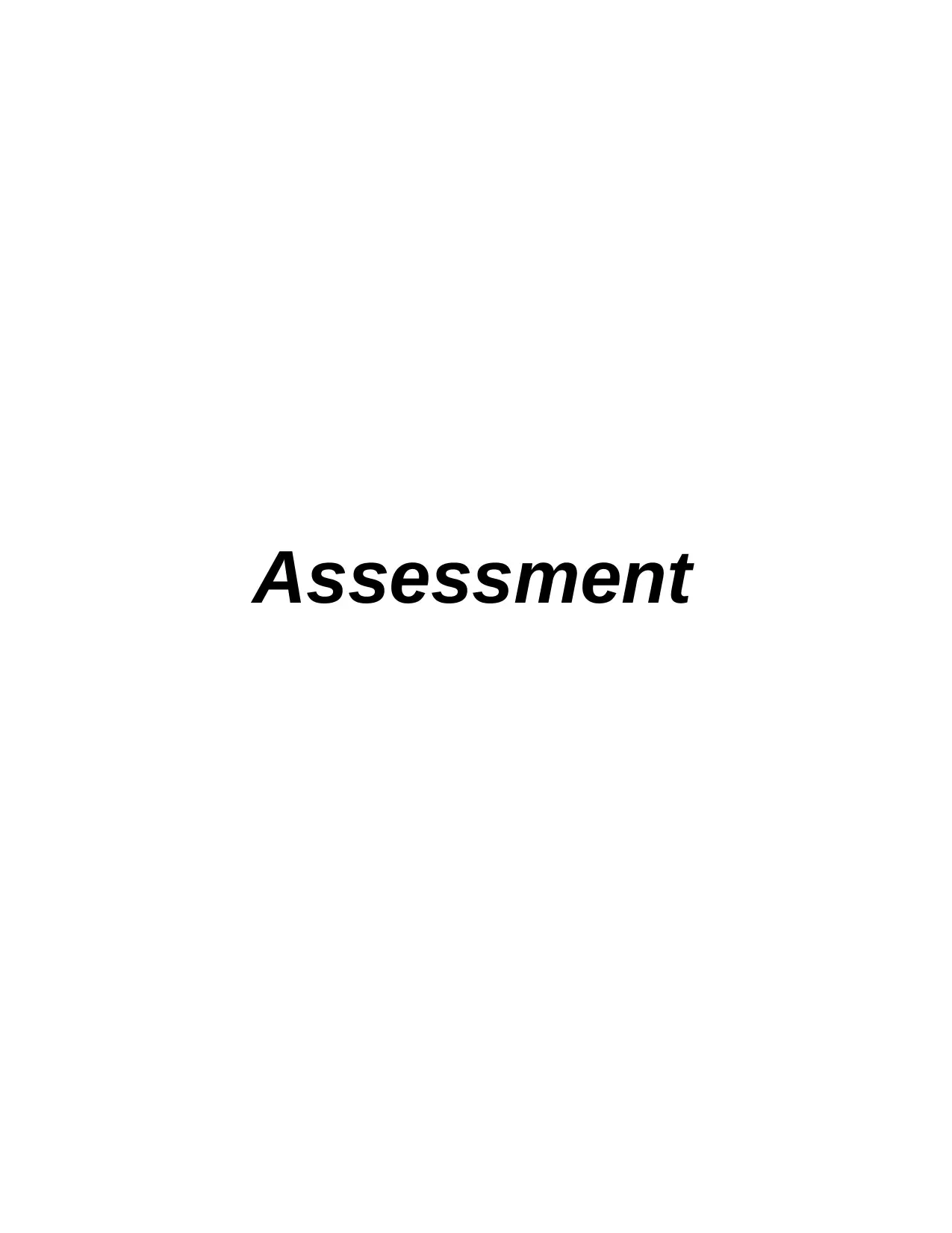
Assessment
Paraphrase This Document
Need a fresh take? Get an instant paraphrase of this document with our AI Paraphraser
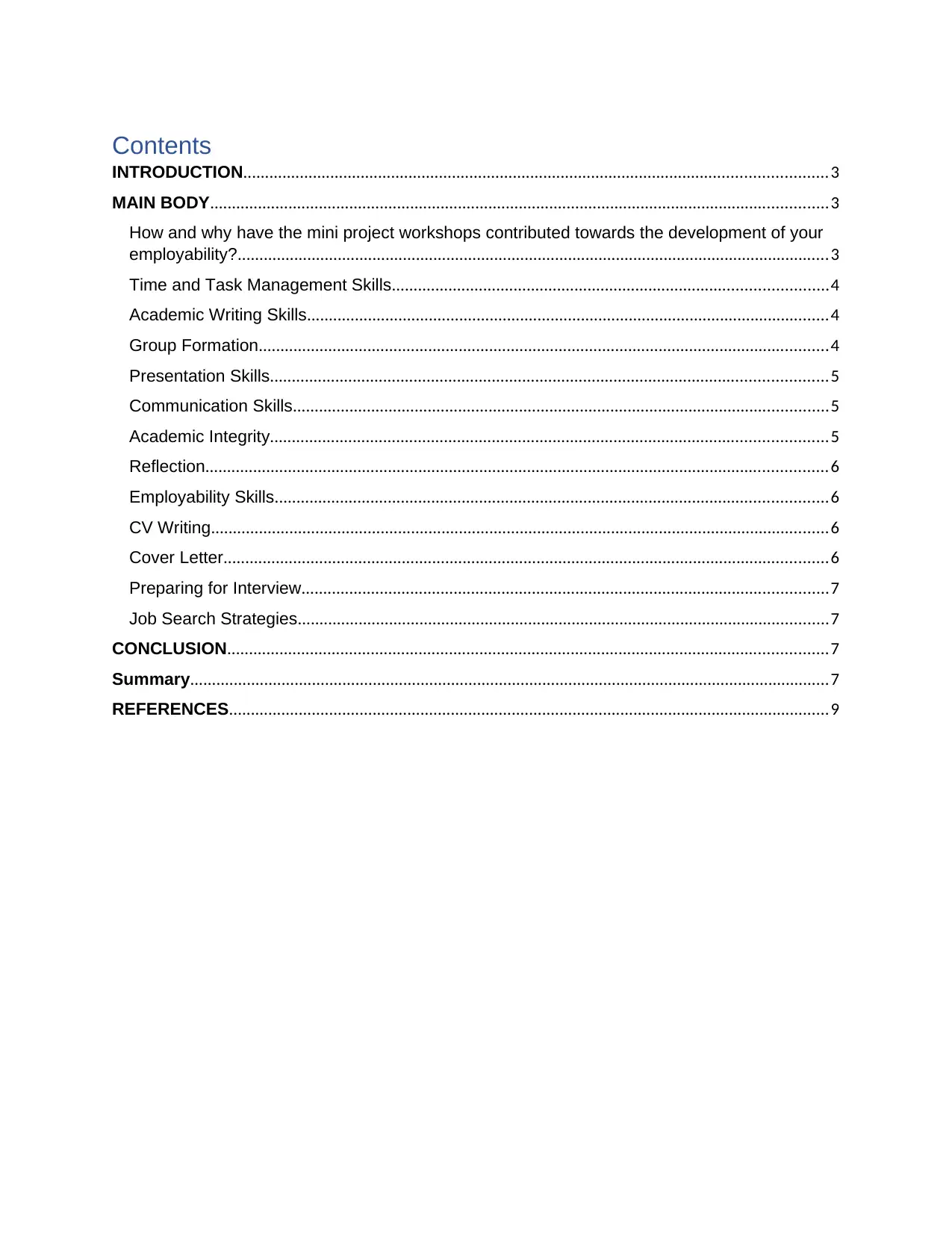
Contents
INTRODUCTION......................................................................................................................................3
MAIN BODY..............................................................................................................................................3
How and why have the mini project workshops contributed towards the development of your
employability?........................................................................................................................................3
Time and Task Management Skills....................................................................................................4
Academic Writing Skills........................................................................................................................4
Group Formation...................................................................................................................................4
Presentation Skills................................................................................................................................5
Communication Skills...........................................................................................................................5
Academic Integrity................................................................................................................................5
Reflection...............................................................................................................................................6
Employability Skills...............................................................................................................................6
CV Writing..............................................................................................................................................6
Cover Letter...........................................................................................................................................6
Preparing for Interview.........................................................................................................................7
Job Search Strategies..........................................................................................................................7
CONCLUSION..........................................................................................................................................7
Summary...................................................................................................................................................7
REFERENCES..........................................................................................................................................9
INTRODUCTION......................................................................................................................................3
MAIN BODY..............................................................................................................................................3
How and why have the mini project workshops contributed towards the development of your
employability?........................................................................................................................................3
Time and Task Management Skills....................................................................................................4
Academic Writing Skills........................................................................................................................4
Group Formation...................................................................................................................................4
Presentation Skills................................................................................................................................5
Communication Skills...........................................................................................................................5
Academic Integrity................................................................................................................................5
Reflection...............................................................................................................................................6
Employability Skills...............................................................................................................................6
CV Writing..............................................................................................................................................6
Cover Letter...........................................................................................................................................6
Preparing for Interview.........................................................................................................................7
Job Search Strategies..........................................................................................................................7
CONCLUSION..........................................................................................................................................7
Summary...................................................................................................................................................7
REFERENCES..........................................................................................................................................9
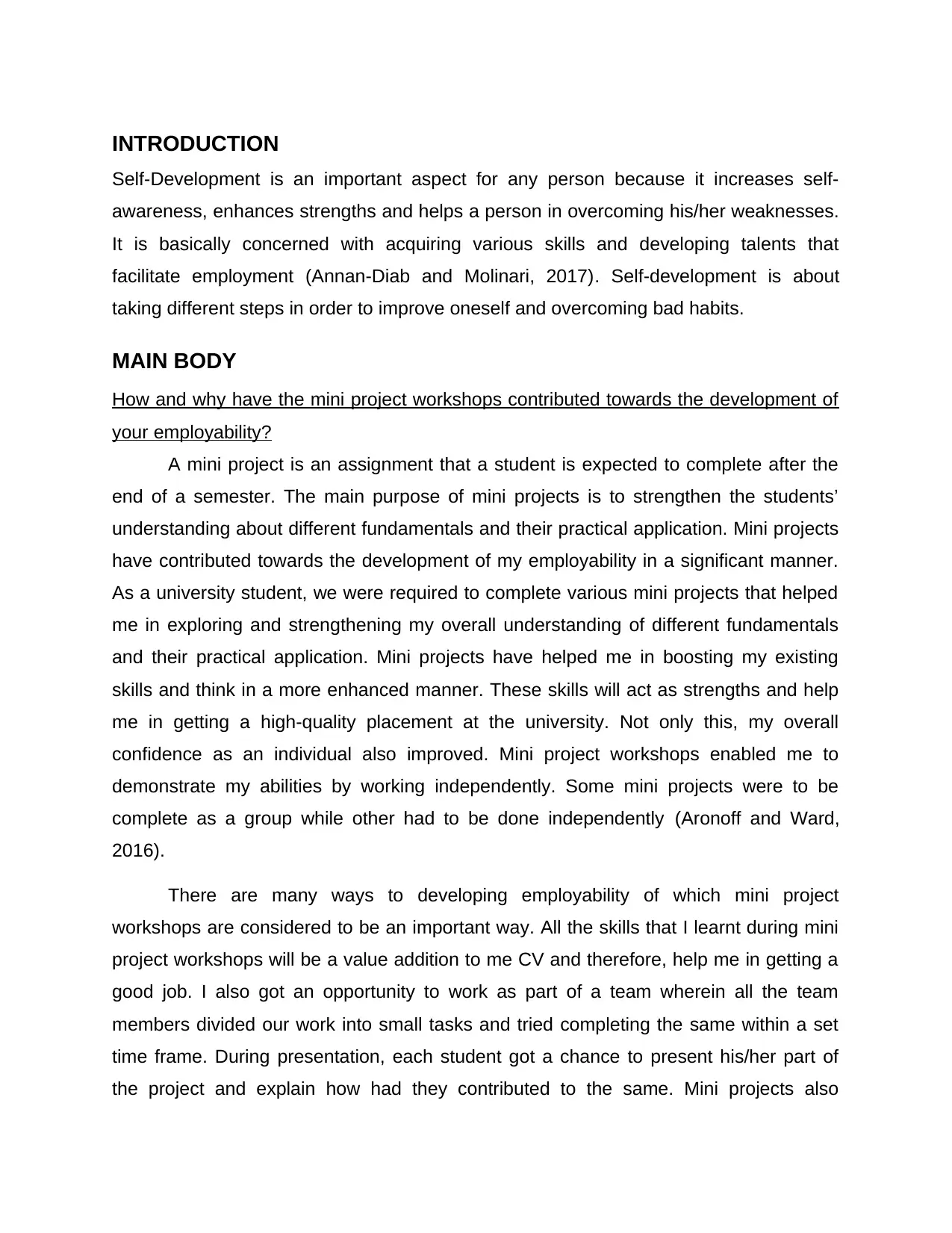
INTRODUCTION
Self-Development is an important aspect for any person because it increases self-
awareness, enhances strengths and helps a person in overcoming his/her weaknesses.
It is basically concerned with acquiring various skills and developing talents that
facilitate employment (Annan-Diab and Molinari, 2017). Self-development is about
taking different steps in order to improve oneself and overcoming bad habits.
MAIN BODY
How and why have the mini project workshops contributed towards the development of
your employability?
A mini project is an assignment that a student is expected to complete after the
end of a semester. The main purpose of mini projects is to strengthen the students’
understanding about different fundamentals and their practical application. Mini projects
have contributed towards the development of my employability in a significant manner.
As a university student, we were required to complete various mini projects that helped
me in exploring and strengthening my overall understanding of different fundamentals
and their practical application. Mini projects have helped me in boosting my existing
skills and think in a more enhanced manner. These skills will act as strengths and help
me in getting a high-quality placement at the university. Not only this, my overall
confidence as an individual also improved. Mini project workshops enabled me to
demonstrate my abilities by working independently. Some mini projects were to be
complete as a group while other had to be done independently (Aronoff and Ward,
2016).
There are many ways to developing employability of which mini project
workshops are considered to be an important way. All the skills that I learnt during mini
project workshops will be a value addition to me CV and therefore, help me in getting a
good job. I also got an opportunity to work as part of a team wherein all the team
members divided our work into small tasks and tried completing the same within a set
time frame. During presentation, each student got a chance to present his/her part of
the project and explain how had they contributed to the same. Mini projects also
Self-Development is an important aspect for any person because it increases self-
awareness, enhances strengths and helps a person in overcoming his/her weaknesses.
It is basically concerned with acquiring various skills and developing talents that
facilitate employment (Annan-Diab and Molinari, 2017). Self-development is about
taking different steps in order to improve oneself and overcoming bad habits.
MAIN BODY
How and why have the mini project workshops contributed towards the development of
your employability?
A mini project is an assignment that a student is expected to complete after the
end of a semester. The main purpose of mini projects is to strengthen the students’
understanding about different fundamentals and their practical application. Mini projects
have contributed towards the development of my employability in a significant manner.
As a university student, we were required to complete various mini projects that helped
me in exploring and strengthening my overall understanding of different fundamentals
and their practical application. Mini projects have helped me in boosting my existing
skills and think in a more enhanced manner. These skills will act as strengths and help
me in getting a high-quality placement at the university. Not only this, my overall
confidence as an individual also improved. Mini project workshops enabled me to
demonstrate my abilities by working independently. Some mini projects were to be
complete as a group while other had to be done independently (Aronoff and Ward,
2016).
There are many ways to developing employability of which mini project
workshops are considered to be an important way. All the skills that I learnt during mini
project workshops will be a value addition to me CV and therefore, help me in getting a
good job. I also got an opportunity to work as part of a team wherein all the team
members divided our work into small tasks and tried completing the same within a set
time frame. During presentation, each student got a chance to present his/her part of
the project and explain how had they contributed to the same. Mini projects also
⊘ This is a preview!⊘
Do you want full access?
Subscribe today to unlock all pages.

Trusted by 1+ million students worldwide
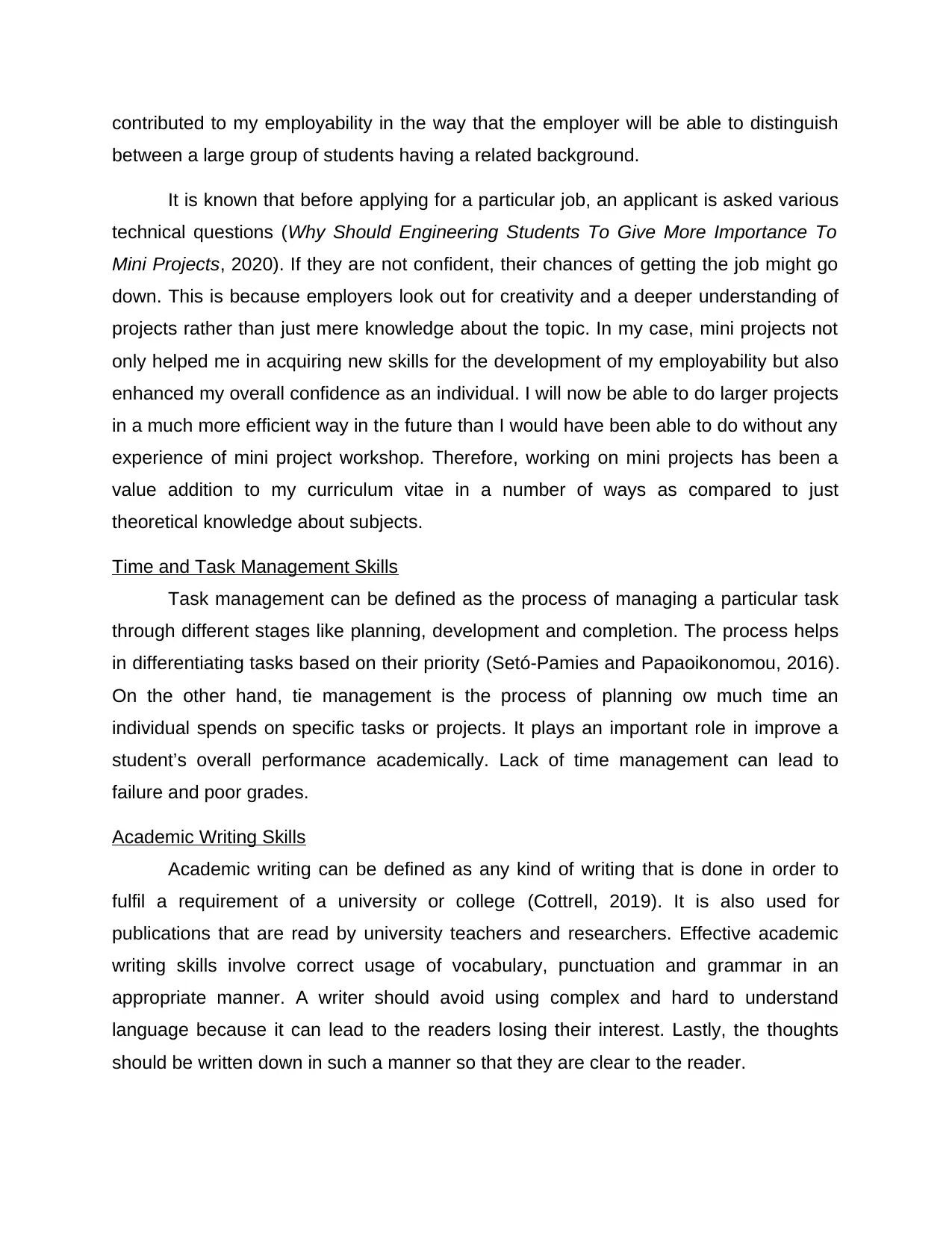
contributed to my employability in the way that the employer will be able to distinguish
between a large group of students having a related background.
It is known that before applying for a particular job, an applicant is asked various
technical questions (Why Should Engineering Students To Give More Importance To
Mini Projects, 2020). If they are not confident, their chances of getting the job might go
down. This is because employers look out for creativity and a deeper understanding of
projects rather than just mere knowledge about the topic. In my case, mini projects not
only helped me in acquiring new skills for the development of my employability but also
enhanced my overall confidence as an individual. I will now be able to do larger projects
in a much more efficient way in the future than I would have been able to do without any
experience of mini project workshop. Therefore, working on mini projects has been a
value addition to my curriculum vitae in a number of ways as compared to just
theoretical knowledge about subjects.
Time and Task Management Skills
Task management can be defined as the process of managing a particular task
through different stages like planning, development and completion. The process helps
in differentiating tasks based on their priority (Setó-Pamies and Papaoikonomou, 2016).
On the other hand, tie management is the process of planning ow much time an
individual spends on specific tasks or projects. It plays an important role in improve a
student’s overall performance academically. Lack of time management can lead to
failure and poor grades.
Academic Writing Skills
Academic writing can be defined as any kind of writing that is done in order to
fulfil a requirement of a university or college (Cottrell, 2019). It is also used for
publications that are read by university teachers and researchers. Effective academic
writing skills involve correct usage of vocabulary, punctuation and grammar in an
appropriate manner. A writer should avoid using complex and hard to understand
language because it can lead to the readers losing their interest. Lastly, the thoughts
should be written down in such a manner so that they are clear to the reader.
between a large group of students having a related background.
It is known that before applying for a particular job, an applicant is asked various
technical questions (Why Should Engineering Students To Give More Importance To
Mini Projects, 2020). If they are not confident, their chances of getting the job might go
down. This is because employers look out for creativity and a deeper understanding of
projects rather than just mere knowledge about the topic. In my case, mini projects not
only helped me in acquiring new skills for the development of my employability but also
enhanced my overall confidence as an individual. I will now be able to do larger projects
in a much more efficient way in the future than I would have been able to do without any
experience of mini project workshop. Therefore, working on mini projects has been a
value addition to my curriculum vitae in a number of ways as compared to just
theoretical knowledge about subjects.
Time and Task Management Skills
Task management can be defined as the process of managing a particular task
through different stages like planning, development and completion. The process helps
in differentiating tasks based on their priority (Setó-Pamies and Papaoikonomou, 2016).
On the other hand, tie management is the process of planning ow much time an
individual spends on specific tasks or projects. It plays an important role in improve a
student’s overall performance academically. Lack of time management can lead to
failure and poor grades.
Academic Writing Skills
Academic writing can be defined as any kind of writing that is done in order to
fulfil a requirement of a university or college (Cottrell, 2019). It is also used for
publications that are read by university teachers and researchers. Effective academic
writing skills involve correct usage of vocabulary, punctuation and grammar in an
appropriate manner. A writer should avoid using complex and hard to understand
language because it can lead to the readers losing their interest. Lastly, the thoughts
should be written down in such a manner so that they are clear to the reader.
Paraphrase This Document
Need a fresh take? Get an instant paraphrase of this document with our AI Paraphraser
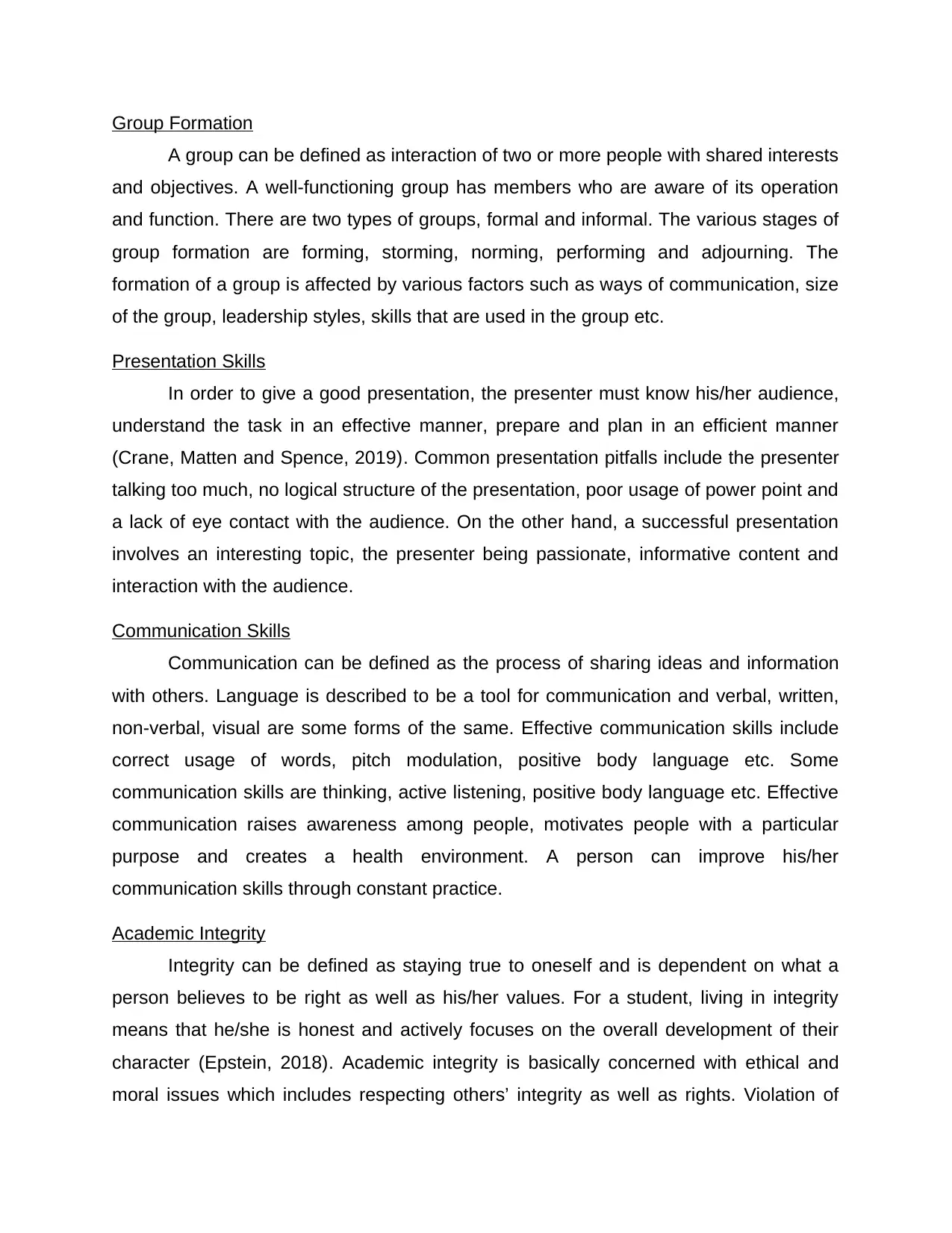
Group Formation
A group can be defined as interaction of two or more people with shared interests
and objectives. A well-functioning group has members who are aware of its operation
and function. There are two types of groups, formal and informal. The various stages of
group formation are forming, storming, norming, performing and adjourning. The
formation of a group is affected by various factors such as ways of communication, size
of the group, leadership styles, skills that are used in the group etc.
Presentation Skills
In order to give a good presentation, the presenter must know his/her audience,
understand the task in an effective manner, prepare and plan in an efficient manner
(Crane, Matten and Spence, 2019). Common presentation pitfalls include the presenter
talking too much, no logical structure of the presentation, poor usage of power point and
a lack of eye contact with the audience. On the other hand, a successful presentation
involves an interesting topic, the presenter being passionate, informative content and
interaction with the audience.
Communication Skills
Communication can be defined as the process of sharing ideas and information
with others. Language is described to be a tool for communication and verbal, written,
non-verbal, visual are some forms of the same. Effective communication skills include
correct usage of words, pitch modulation, positive body language etc. Some
communication skills are thinking, active listening, positive body language etc. Effective
communication raises awareness among people, motivates people with a particular
purpose and creates a health environment. A person can improve his/her
communication skills through constant practice.
Academic Integrity
Integrity can be defined as staying true to oneself and is dependent on what a
person believes to be right as well as his/her values. For a student, living in integrity
means that he/she is honest and actively focuses on the overall development of their
character (Epstein, 2018). Academic integrity is basically concerned with ethical and
moral issues which includes respecting others’ integrity as well as rights. Violation of
A group can be defined as interaction of two or more people with shared interests
and objectives. A well-functioning group has members who are aware of its operation
and function. There are two types of groups, formal and informal. The various stages of
group formation are forming, storming, norming, performing and adjourning. The
formation of a group is affected by various factors such as ways of communication, size
of the group, leadership styles, skills that are used in the group etc.
Presentation Skills
In order to give a good presentation, the presenter must know his/her audience,
understand the task in an effective manner, prepare and plan in an efficient manner
(Crane, Matten and Spence, 2019). Common presentation pitfalls include the presenter
talking too much, no logical structure of the presentation, poor usage of power point and
a lack of eye contact with the audience. On the other hand, a successful presentation
involves an interesting topic, the presenter being passionate, informative content and
interaction with the audience.
Communication Skills
Communication can be defined as the process of sharing ideas and information
with others. Language is described to be a tool for communication and verbal, written,
non-verbal, visual are some forms of the same. Effective communication skills include
correct usage of words, pitch modulation, positive body language etc. Some
communication skills are thinking, active listening, positive body language etc. Effective
communication raises awareness among people, motivates people with a particular
purpose and creates a health environment. A person can improve his/her
communication skills through constant practice.
Academic Integrity
Integrity can be defined as staying true to oneself and is dependent on what a
person believes to be right as well as his/her values. For a student, living in integrity
means that he/she is honest and actively focuses on the overall development of their
character (Epstein, 2018). Academic integrity is basically concerned with ethical and
moral issues which includes respecting others’ integrity as well as rights. Violation of
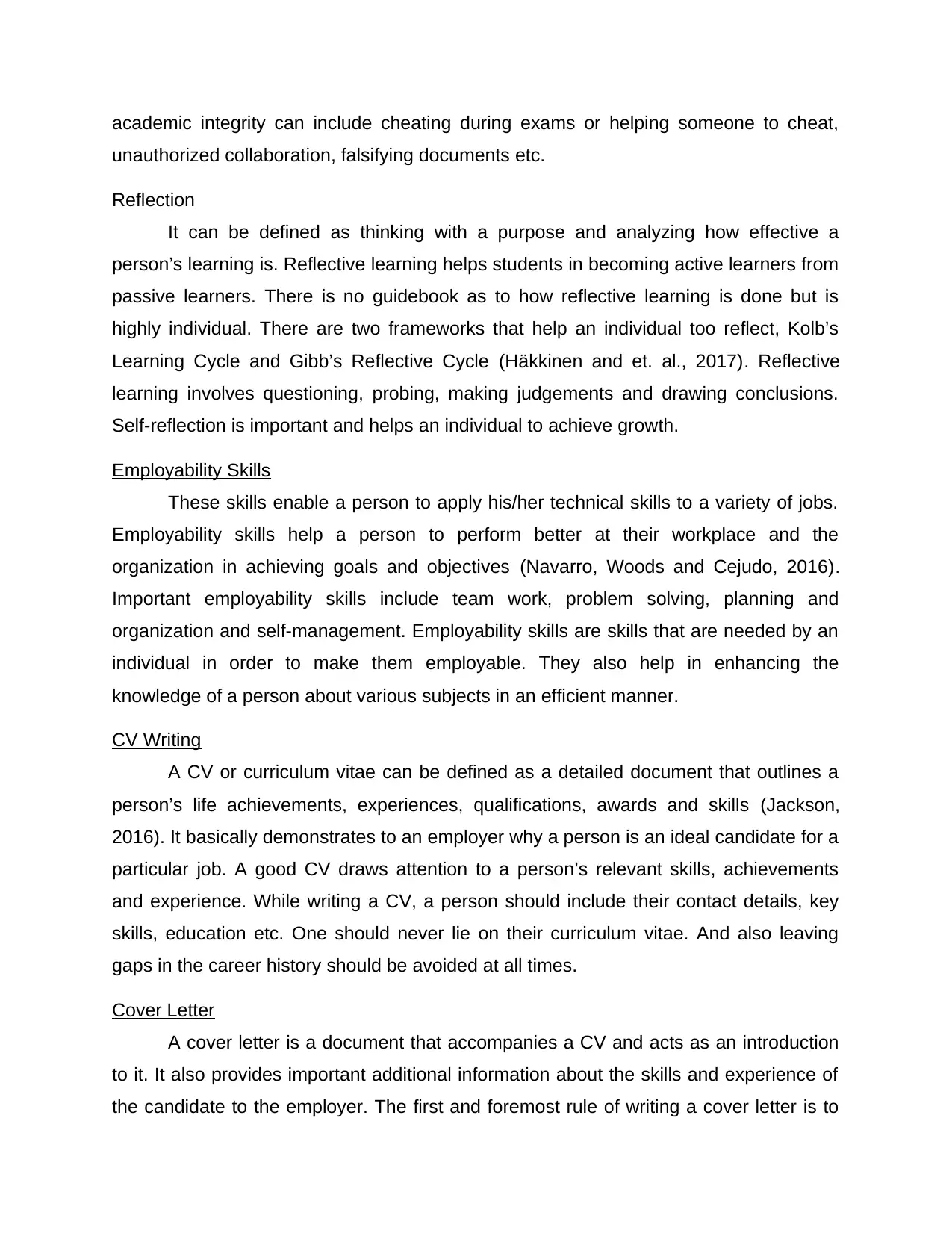
academic integrity can include cheating during exams or helping someone to cheat,
unauthorized collaboration, falsifying documents etc.
Reflection
It can be defined as thinking with a purpose and analyzing how effective a
person’s learning is. Reflective learning helps students in becoming active learners from
passive learners. There is no guidebook as to how reflective learning is done but is
highly individual. There are two frameworks that help an individual too reflect, Kolb’s
Learning Cycle and Gibb’s Reflective Cycle (Häkkinen and et. al., 2017). Reflective
learning involves questioning, probing, making judgements and drawing conclusions.
Self-reflection is important and helps an individual to achieve growth.
Employability Skills
These skills enable a person to apply his/her technical skills to a variety of jobs.
Employability skills help a person to perform better at their workplace and the
organization in achieving goals and objectives (Navarro, Woods and Cejudo, 2016).
Important employability skills include team work, problem solving, planning and
organization and self-management. Employability skills are skills that are needed by an
individual in order to make them employable. They also help in enhancing the
knowledge of a person about various subjects in an efficient manner.
CV Writing
A CV or curriculum vitae can be defined as a detailed document that outlines a
person’s life achievements, experiences, qualifications, awards and skills (Jackson,
2016). It basically demonstrates to an employer why a person is an ideal candidate for a
particular job. A good CV draws attention to a person’s relevant skills, achievements
and experience. While writing a CV, a person should include their contact details, key
skills, education etc. One should never lie on their curriculum vitae. And also leaving
gaps in the career history should be avoided at all times.
Cover Letter
A cover letter is a document that accompanies a CV and acts as an introduction
to it. It also provides important additional information about the skills and experience of
the candidate to the employer. The first and foremost rule of writing a cover letter is to
unauthorized collaboration, falsifying documents etc.
Reflection
It can be defined as thinking with a purpose and analyzing how effective a
person’s learning is. Reflective learning helps students in becoming active learners from
passive learners. There is no guidebook as to how reflective learning is done but is
highly individual. There are two frameworks that help an individual too reflect, Kolb’s
Learning Cycle and Gibb’s Reflective Cycle (Häkkinen and et. al., 2017). Reflective
learning involves questioning, probing, making judgements and drawing conclusions.
Self-reflection is important and helps an individual to achieve growth.
Employability Skills
These skills enable a person to apply his/her technical skills to a variety of jobs.
Employability skills help a person to perform better at their workplace and the
organization in achieving goals and objectives (Navarro, Woods and Cejudo, 2016).
Important employability skills include team work, problem solving, planning and
organization and self-management. Employability skills are skills that are needed by an
individual in order to make them employable. They also help in enhancing the
knowledge of a person about various subjects in an efficient manner.
CV Writing
A CV or curriculum vitae can be defined as a detailed document that outlines a
person’s life achievements, experiences, qualifications, awards and skills (Jackson,
2016). It basically demonstrates to an employer why a person is an ideal candidate for a
particular job. A good CV draws attention to a person’s relevant skills, achievements
and experience. While writing a CV, a person should include their contact details, key
skills, education etc. One should never lie on their curriculum vitae. And also leaving
gaps in the career history should be avoided at all times.
Cover Letter
A cover letter is a document that accompanies a CV and acts as an introduction
to it. It also provides important additional information about the skills and experience of
the candidate to the employer. The first and foremost rule of writing a cover letter is to
⊘ This is a preview!⊘
Do you want full access?
Subscribe today to unlock all pages.

Trusted by 1+ million students worldwide
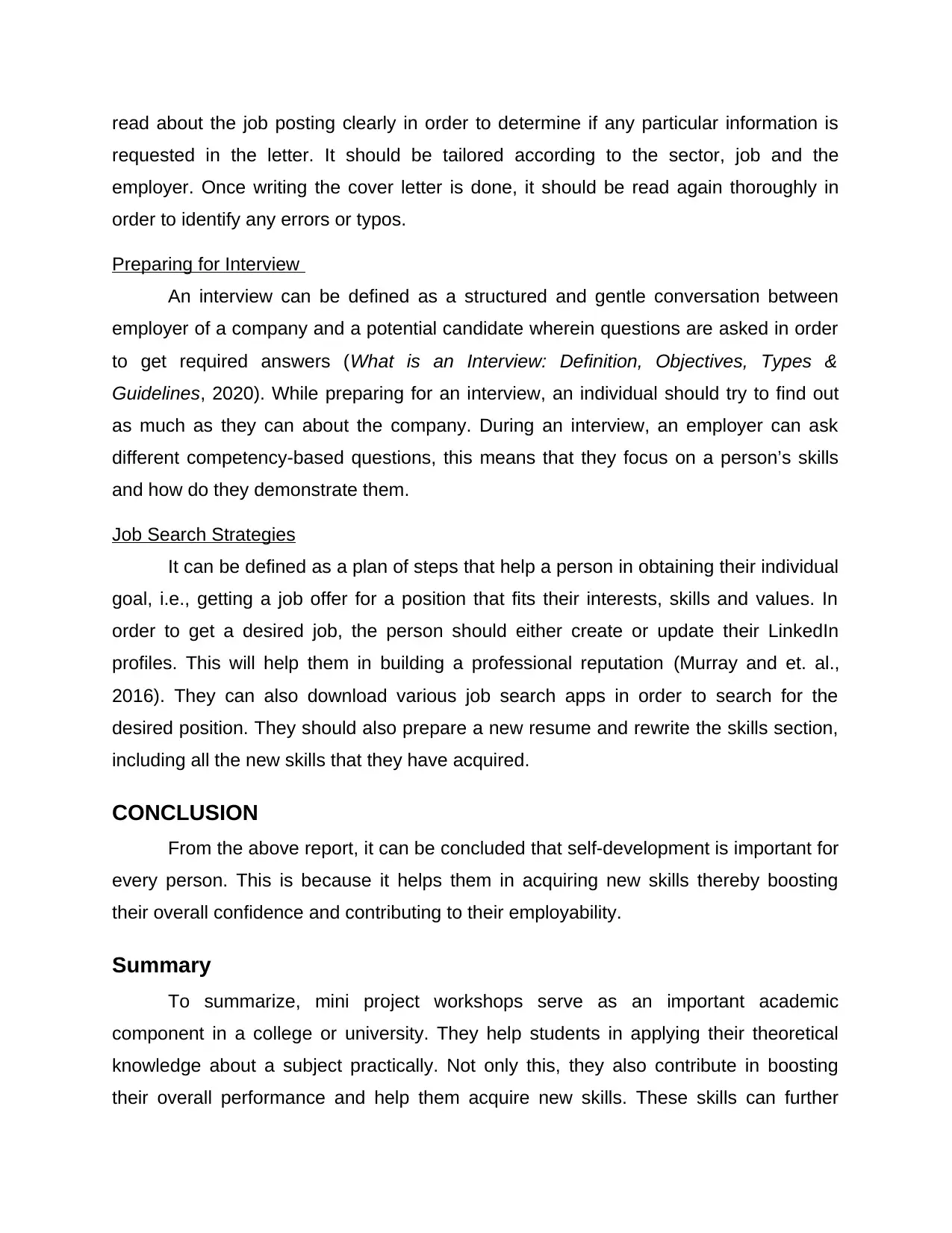
read about the job posting clearly in order to determine if any particular information is
requested in the letter. It should be tailored according to the sector, job and the
employer. Once writing the cover letter is done, it should be read again thoroughly in
order to identify any errors or typos.
Preparing for Interview
An interview can be defined as a structured and gentle conversation between
employer of a company and a potential candidate wherein questions are asked in order
to get required answers (What is an Interview: Definition, Objectives, Types &
Guidelines, 2020). While preparing for an interview, an individual should try to find out
as much as they can about the company. During an interview, an employer can ask
different competency-based questions, this means that they focus on a person’s skills
and how do they demonstrate them.
Job Search Strategies
It can be defined as a plan of steps that help a person in obtaining their individual
goal, i.e., getting a job offer for a position that fits their interests, skills and values. In
order to get a desired job, the person should either create or update their LinkedIn
profiles. This will help them in building a professional reputation (Murray and et. al.,
2016). They can also download various job search apps in order to search for the
desired position. They should also prepare a new resume and rewrite the skills section,
including all the new skills that they have acquired.
CONCLUSION
From the above report, it can be concluded that self-development is important for
every person. This is because it helps them in acquiring new skills thereby boosting
their overall confidence and contributing to their employability.
Summary
To summarize, mini project workshops serve as an important academic
component in a college or university. They help students in applying their theoretical
knowledge about a subject practically. Not only this, they also contribute in boosting
their overall performance and help them acquire new skills. These skills can further
requested in the letter. It should be tailored according to the sector, job and the
employer. Once writing the cover letter is done, it should be read again thoroughly in
order to identify any errors or typos.
Preparing for Interview
An interview can be defined as a structured and gentle conversation between
employer of a company and a potential candidate wherein questions are asked in order
to get required answers (What is an Interview: Definition, Objectives, Types &
Guidelines, 2020). While preparing for an interview, an individual should try to find out
as much as they can about the company. During an interview, an employer can ask
different competency-based questions, this means that they focus on a person’s skills
and how do they demonstrate them.
Job Search Strategies
It can be defined as a plan of steps that help a person in obtaining their individual
goal, i.e., getting a job offer for a position that fits their interests, skills and values. In
order to get a desired job, the person should either create or update their LinkedIn
profiles. This will help them in building a professional reputation (Murray and et. al.,
2016). They can also download various job search apps in order to search for the
desired position. They should also prepare a new resume and rewrite the skills section,
including all the new skills that they have acquired.
CONCLUSION
From the above report, it can be concluded that self-development is important for
every person. This is because it helps them in acquiring new skills thereby boosting
their overall confidence and contributing to their employability.
Summary
To summarize, mini project workshops serve as an important academic
component in a college or university. They help students in applying their theoretical
knowledge about a subject practically. Not only this, they also contribute in boosting
their overall performance and help them acquire new skills. These skills can further
Paraphrase This Document
Need a fresh take? Get an instant paraphrase of this document with our AI Paraphraser
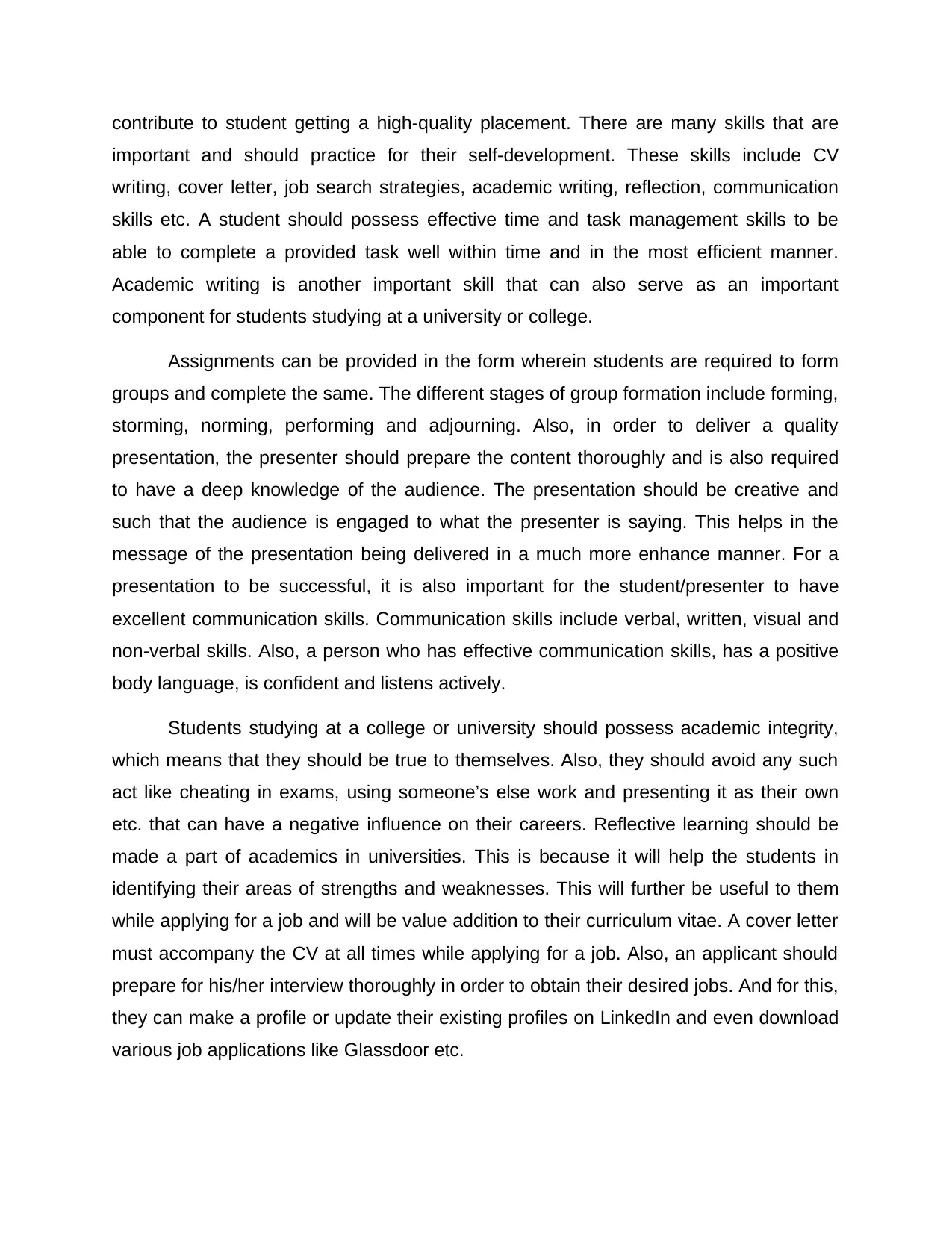
contribute to student getting a high-quality placement. There are many skills that are
important and should practice for their self-development. These skills include CV
writing, cover letter, job search strategies, academic writing, reflection, communication
skills etc. A student should possess effective time and task management skills to be
able to complete a provided task well within time and in the most efficient manner.
Academic writing is another important skill that can also serve as an important
component for students studying at a university or college.
Assignments can be provided in the form wherein students are required to form
groups and complete the same. The different stages of group formation include forming,
storming, norming, performing and adjourning. Also, in order to deliver a quality
presentation, the presenter should prepare the content thoroughly and is also required
to have a deep knowledge of the audience. The presentation should be creative and
such that the audience is engaged to what the presenter is saying. This helps in the
message of the presentation being delivered in a much more enhance manner. For a
presentation to be successful, it is also important for the student/presenter to have
excellent communication skills. Communication skills include verbal, written, visual and
non-verbal skills. Also, a person who has effective communication skills, has a positive
body language, is confident and listens actively.
Students studying at a college or university should possess academic integrity,
which means that they should be true to themselves. Also, they should avoid any such
act like cheating in exams, using someone’s else work and presenting it as their own
etc. that can have a negative influence on their careers. Reflective learning should be
made a part of academics in universities. This is because it will help the students in
identifying their areas of strengths and weaknesses. This will further be useful to them
while applying for a job and will be value addition to their curriculum vitae. A cover letter
must accompany the CV at all times while applying for a job. Also, an applicant should
prepare for his/her interview thoroughly in order to obtain their desired jobs. And for this,
they can make a profile or update their existing profiles on LinkedIn and even download
various job applications like Glassdoor etc.
important and should practice for their self-development. These skills include CV
writing, cover letter, job search strategies, academic writing, reflection, communication
skills etc. A student should possess effective time and task management skills to be
able to complete a provided task well within time and in the most efficient manner.
Academic writing is another important skill that can also serve as an important
component for students studying at a university or college.
Assignments can be provided in the form wherein students are required to form
groups and complete the same. The different stages of group formation include forming,
storming, norming, performing and adjourning. Also, in order to deliver a quality
presentation, the presenter should prepare the content thoroughly and is also required
to have a deep knowledge of the audience. The presentation should be creative and
such that the audience is engaged to what the presenter is saying. This helps in the
message of the presentation being delivered in a much more enhance manner. For a
presentation to be successful, it is also important for the student/presenter to have
excellent communication skills. Communication skills include verbal, written, visual and
non-verbal skills. Also, a person who has effective communication skills, has a positive
body language, is confident and listens actively.
Students studying at a college or university should possess academic integrity,
which means that they should be true to themselves. Also, they should avoid any such
act like cheating in exams, using someone’s else work and presenting it as their own
etc. that can have a negative influence on their careers. Reflective learning should be
made a part of academics in universities. This is because it will help the students in
identifying their areas of strengths and weaknesses. This will further be useful to them
while applying for a job and will be value addition to their curriculum vitae. A cover letter
must accompany the CV at all times while applying for a job. Also, an applicant should
prepare for his/her interview thoroughly in order to obtain their desired jobs. And for this,
they can make a profile or update their existing profiles on LinkedIn and even download
various job applications like Glassdoor etc.

⊘ This is a preview!⊘
Do you want full access?
Subscribe today to unlock all pages.

Trusted by 1+ million students worldwide
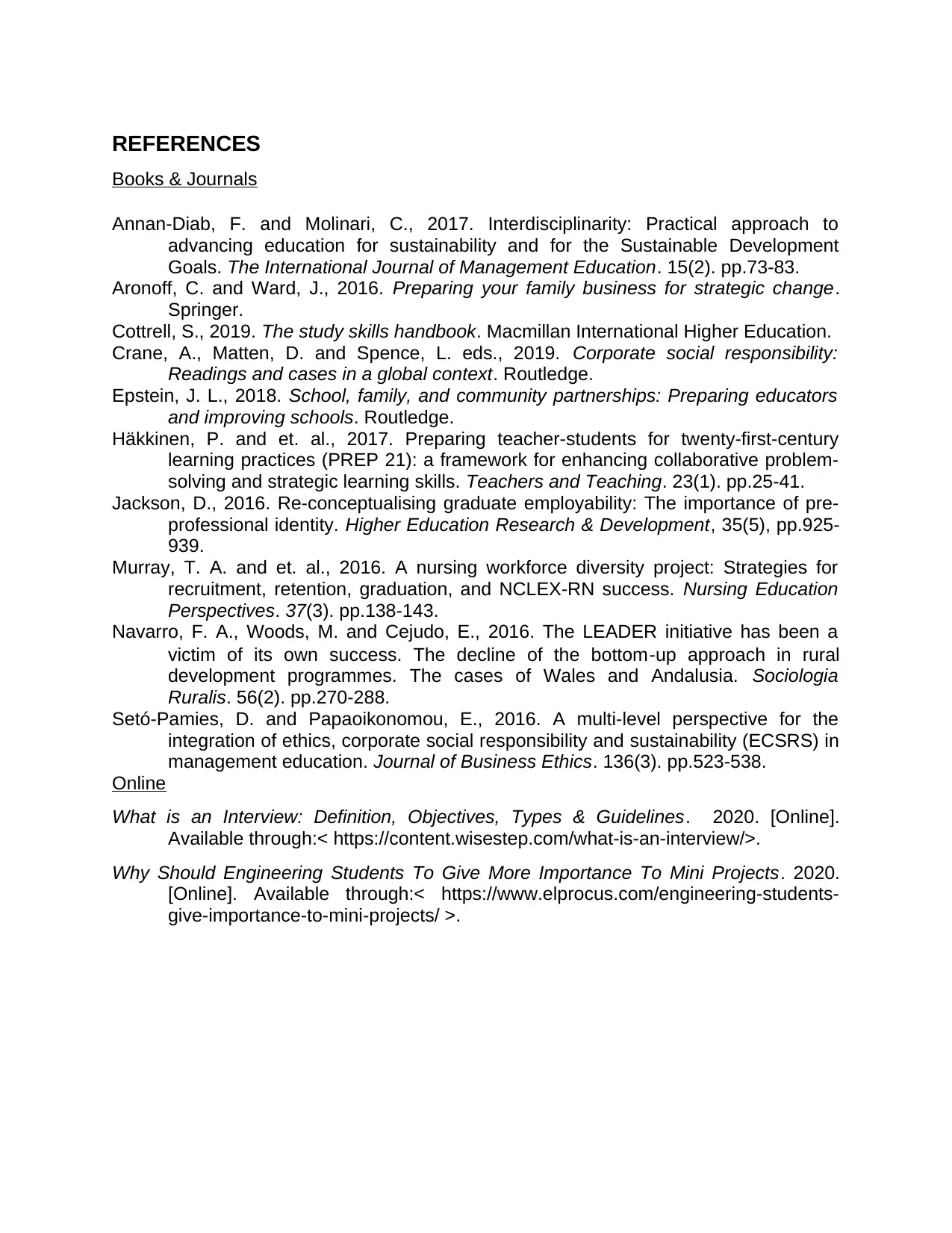
REFERENCES
Books & Journals
Annan-Diab, F. and Molinari, C., 2017. Interdisciplinarity: Practical approach to
advancing education for sustainability and for the Sustainable Development
Goals. The International Journal of Management Education. 15(2). pp.73-83.
Aronoff, C. and Ward, J., 2016. Preparing your family business for strategic change.
Springer.
Cottrell, S., 2019. The study skills handbook. Macmillan International Higher Education.
Crane, A., Matten, D. and Spence, L. eds., 2019. Corporate social responsibility:
Readings and cases in a global context. Routledge.
Epstein, J. L., 2018. School, family, and community partnerships: Preparing educators
and improving schools. Routledge.
Häkkinen, P. and et. al., 2017. Preparing teacher-students for twenty-first-century
learning practices (PREP 21): a framework for enhancing collaborative problem-
solving and strategic learning skills. Teachers and Teaching. 23(1). pp.25-41.
Jackson, D., 2016. Re-conceptualising graduate employability: The importance of pre-
professional identity. Higher Education Research & Development, 35(5), pp.925-
939.
Murray, T. A. and et. al., 2016. A nursing workforce diversity project: Strategies for
recruitment, retention, graduation, and NCLEX-RN success. Nursing Education
Perspectives. 37(3). pp.138-143.
Navarro, F. A., Woods, M. and Cejudo, E., 2016. The LEADER initiative has been a
victim of its own success. The decline of the bottom‐up approach in rural
development programmes. The cases of Wales and Andalusia. Sociologia
Ruralis. 56(2). pp.270-288.
Setó-Pamies, D. and Papaoikonomou, E., 2016. A multi-level perspective for the
integration of ethics, corporate social responsibility and sustainability (ECSRS) in
management education. Journal of Business Ethics. 136(3). pp.523-538.
Online
What is an Interview: Definition, Objectives, Types & Guidelines. 2020. [Online].
Available through:< https://content.wisestep.com/what-is-an-interview/>.
Why Should Engineering Students To Give More Importance To Mini Projects. 2020.
[Online]. Available through:< https://www.elprocus.com/engineering-students-
give-importance-to-mini-projects/ >.
Books & Journals
Annan-Diab, F. and Molinari, C., 2017. Interdisciplinarity: Practical approach to
advancing education for sustainability and for the Sustainable Development
Goals. The International Journal of Management Education. 15(2). pp.73-83.
Aronoff, C. and Ward, J., 2016. Preparing your family business for strategic change.
Springer.
Cottrell, S., 2019. The study skills handbook. Macmillan International Higher Education.
Crane, A., Matten, D. and Spence, L. eds., 2019. Corporate social responsibility:
Readings and cases in a global context. Routledge.
Epstein, J. L., 2018. School, family, and community partnerships: Preparing educators
and improving schools. Routledge.
Häkkinen, P. and et. al., 2017. Preparing teacher-students for twenty-first-century
learning practices (PREP 21): a framework for enhancing collaborative problem-
solving and strategic learning skills. Teachers and Teaching. 23(1). pp.25-41.
Jackson, D., 2016. Re-conceptualising graduate employability: The importance of pre-
professional identity. Higher Education Research & Development, 35(5), pp.925-
939.
Murray, T. A. and et. al., 2016. A nursing workforce diversity project: Strategies for
recruitment, retention, graduation, and NCLEX-RN success. Nursing Education
Perspectives. 37(3). pp.138-143.
Navarro, F. A., Woods, M. and Cejudo, E., 2016. The LEADER initiative has been a
victim of its own success. The decline of the bottom‐up approach in rural
development programmes. The cases of Wales and Andalusia. Sociologia
Ruralis. 56(2). pp.270-288.
Setó-Pamies, D. and Papaoikonomou, E., 2016. A multi-level perspective for the
integration of ethics, corporate social responsibility and sustainability (ECSRS) in
management education. Journal of Business Ethics. 136(3). pp.523-538.
Online
What is an Interview: Definition, Objectives, Types & Guidelines. 2020. [Online].
Available through:< https://content.wisestep.com/what-is-an-interview/>.
Why Should Engineering Students To Give More Importance To Mini Projects. 2020.
[Online]. Available through:< https://www.elprocus.com/engineering-students-
give-importance-to-mini-projects/ >.
1 out of 10
Related Documents
Your All-in-One AI-Powered Toolkit for Academic Success.
+13062052269
info@desklib.com
Available 24*7 on WhatsApp / Email
![[object Object]](/_next/static/media/star-bottom.7253800d.svg)
Unlock your academic potential
Copyright © 2020–2026 A2Z Services. All Rights Reserved. Developed and managed by ZUCOL.





